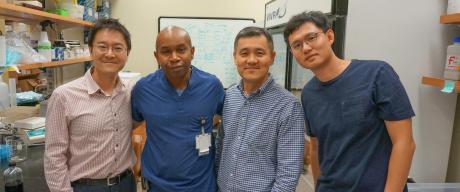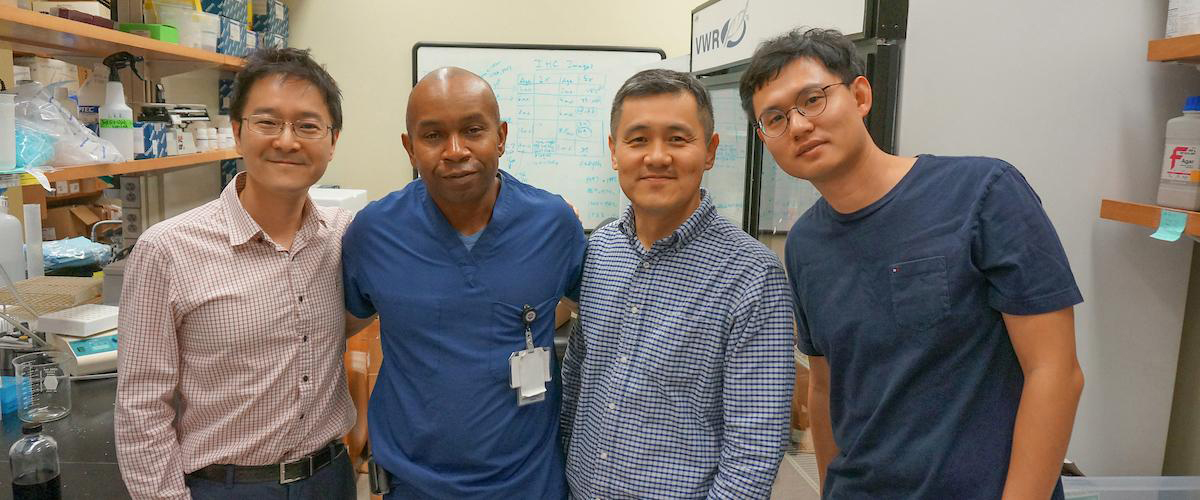Researchers team up for bio-adhesive study


June 2020
Florida A&M and Florida State Universities are leveraging their unique partnership through the FAMU-FSU College of Engineering to create more learning opportunities for underrepresented students in engineering while also making improvements to existing medical applications.
Researchers from the college, in collaboration with the FSU College of Medicine, have received a $500,000 grant from the National Science Foundation to develop new drug-loadable bio-adhesives, while also creating a new summer research program for engineering undergraduates at the college and local K-12 students in the Tallahassee area.
“This is a perfect example of not only interdisciplinary, collaborative research but also the incredible value of the singular collaboration between Florida A&M University and Florida State University — a partnership embedded in the DNA of the joint college of engineering,” said Associate Dean for Research & Graduate Studies Farrukh Alvi. “The faculty and students in our College of Engineering are catalysts for promoting collaborative discovery in interdisciplinary teams that leverage assets, expertise and opportunities available to both institutions.”
The FAMU-FSU College of Engineering is a joint institution between Florida A&M University and Florida State University, providing students and faculty with the unique benefits of both an HBCU and a Research 1 university. It is the only joint College of Engineering in the country.
Ho Yong Chung, an assistant professor of chemical and biomedical engineering at the FAMU-FSU College of Engineering, is the principal investigator and will work with Choogon Lee, associate professor of the FSU College of Medicine, on the NSF study.
Chung’s group will oversee the development of drug-loadable, fully degradable bio-adhesives for internal organs, and Lee’s group will test the biomedical effectiveness and toxicity of the bio-adhesives.
In preliminary work, these adhesives have shown drug delivery capabilities and improved biocompatibility and are superior to other adhesives currently in use.
Biomedical adhesives are an important new biomaterial, which stably bind two tissue surfaces to replace and enhance surgical suturing. The new adhesives are needed because existing biomedical adhesives have significant limitations like having poor wet adhesion and complex application methods. There are also safety concerns regarding some of the materials that are used.
The newly proposed biomedical adhesives are designed to overcome these problems with bottlebrush polymer architectures that are biodegradable. The multifunctional biomaterial can deliver antibiotics and anticancer drugs to a localized area of the internal organ.
“We are hoping this could reduce high mortality rates associated with difficult surgeries, such as intestinal anastomosis,” Lee said.
Anastomosis usually involves a surgical connection between tubular structures such as blood vessels or intestines. When a section of the intestine is removed, the remaining ends usually are sewn or stapled together. Bacterial infections can contribute to anastomotic leakage and delay wound healing.
The proposed drug-loaded biomedical adhesive will prevent physical leakage from the site and deliver antibiotics to control the bacteria population near the surgery site. In addition, localized anticancer drug delivery to prevent cancer reoccurrence can be beneficial after cancerous anastomosis surgery.
Bottlebrush polymers look somewhat like a bottle brush used to clean a test tube. Compared to conventional linear polymers, bottlebrush polymers have unique super-soft elastomer features that enable efficient adhesion to internal organs in a wet living environment. The super-soft elastomer is stable and flexible and has unique features that have not previously been used in biomedical adhesives.
“We believe that the new proposed drug-loaded biomedical adhesives can be used to treat diseases and cancers that need the delivery of small molecule drugs,” Chung said. “Because the drug can stay in a specific area or internal organ, many side effects can be prevented.”
Researchers say the unique relationship between FAMU and FSU in the joint college is a boon to the project.
The funding for this project is part of NSF’s HBCU-EIR program, which is designed to enhance research programs at HBCUs. The grant will fund a new summer research program for FAMU engineering undergraduates at the college and local underrepresented K-12 students in the Tallahassee area. The project specifically supports three FAMU undergraduate students for work in Chung’s lab each year for the next three years. In addition, the joint research grant will support FAMU doctoral students.
“The project will give underrepresented students exposure to cutting-edge polymer research occurring at the FAMU-FSU College of Engineering, which we hope will motivate them to careers in biomedical research,” Chung said.
For more information on the College of Engineering, please visit https://www.eng.famu.fsu.edu/.

